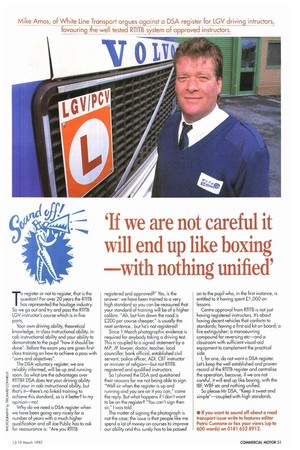'If we are not careful it will end up like boxing with nothing unified'
Page 63

If you've noticed an error in this article please click here to report it so we can fix it.
To register or not to register, that is the question! For over 20 years the RTITB has represented the haulage industry. So we go out and try and pass the RTITB LGV instructor's course which is in five parts.
Your own driving ability, theoretical knowledge, in-class instructional ability, incab instructional ability and your ability to demonstrate to the pupil "how it should be done". Before the exam you are given firstclass training on how to achieve a pass with "aims and objectives".
The DSA voluntary register, we are reliably informed, will be up and running soon. So what are the advantages over RTITB? DSA does test your driving ability and your in-cab instructional ability, but that's it—there's no linked training to achieve this standard, so is it better? In my opinion—no! Why do we need a DSA recister when we have been goin,d, very nice y for a number of years wit-I a much higher qualification and all Joe Public has to ask for reassurance is: "Are you RTITB registered and approved?" Yes, is the answer: we have been trained to a very high standard so you can be reassured that your standard of training will be of a higher calibre. "Ah, but him down the road is £200 per course cheaper," is usually the next sentence...but he's not registered! Since I March photographic evidence is required for anybody ta(ing a driving test. This is coupled to a signed statement by a M P, JP, lawyer, doctor, teacher, local councillor, bank official, established civil servant, police officer, ADI, CBT instructor or minister of religion—but not RTITB registered and qualified instructors. So I phoned the DSA and questioned their reasons for me not being able to sign. "Well sir when the register is up and running and you are on it you can," came the reply. But what happens if I don't want to be on the register? "You can't sign then sir," I was told.
The matter of signing the photograph is not the case; the issue is that people like me spend a lot of money on courses to improve our ability and this surely has to be passed on to the pupil who, in the first instance, is entitled to it having spent £1,000 on lessons.
Centre approval from RTITB is not just having registered instructors. It's about having decent vehicles that conform to standards; having a first aid kit on board; a fire extinguisher; a manoeuvring compound for reversing etc—and a classroom with sufficient visual-aid equipment to complement the practical side.
I, for one, do not want a DSA register. Let's keep the well established and proven record of the RTITB register and centralise the operation, because, if we are not careful, it will end up like boxing, with the IBF, WBF etc and nothing unified. So please Mr DSA, "Keep it sweet and simple—coupled with high standards.
• If you want to sound off about a road transport issue write to features editor Patric Cunnane or fax your views up to 600 words) on 0181 652 8912.
























































































































